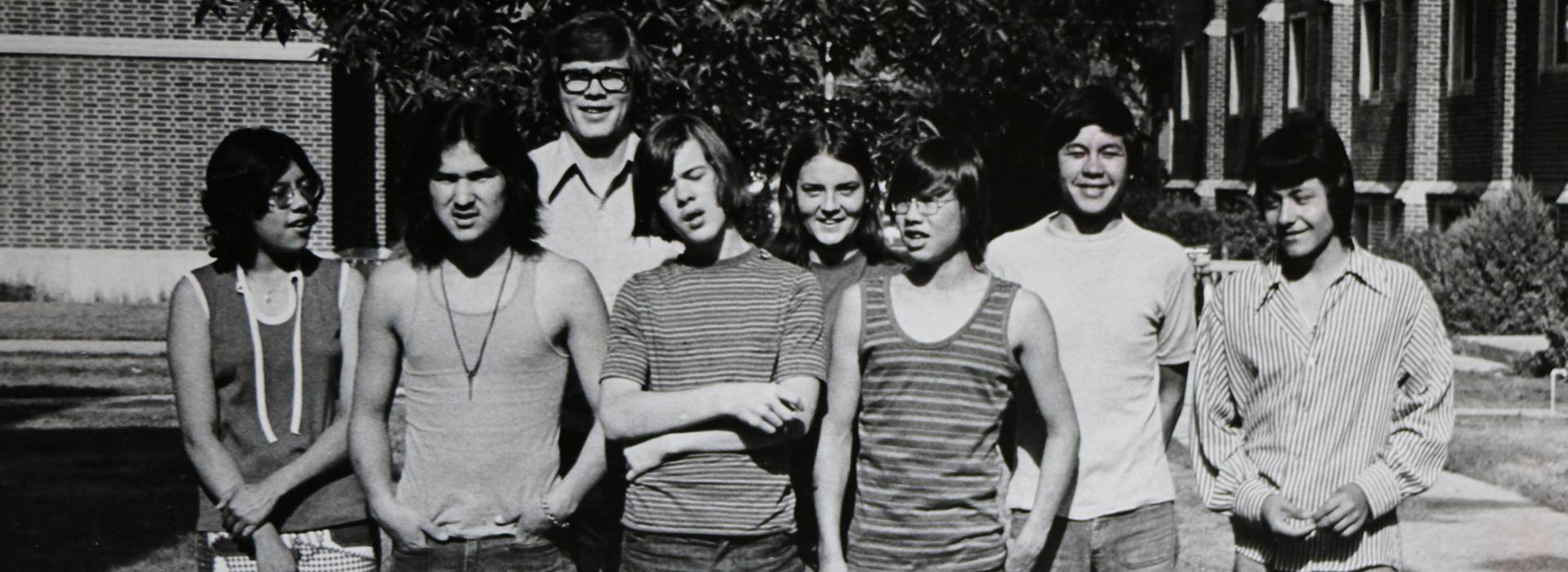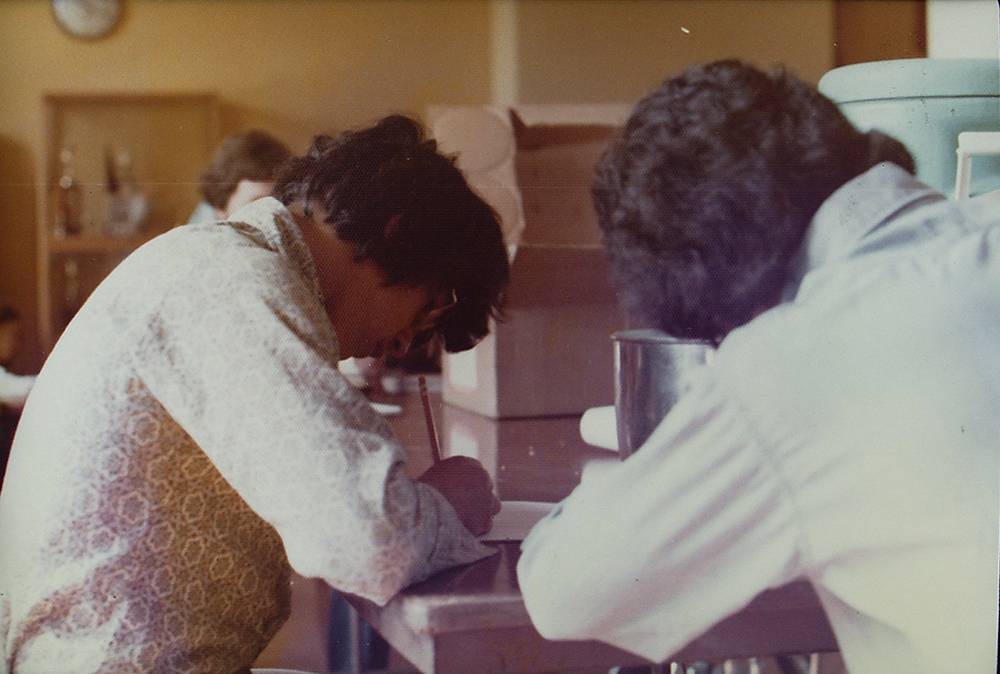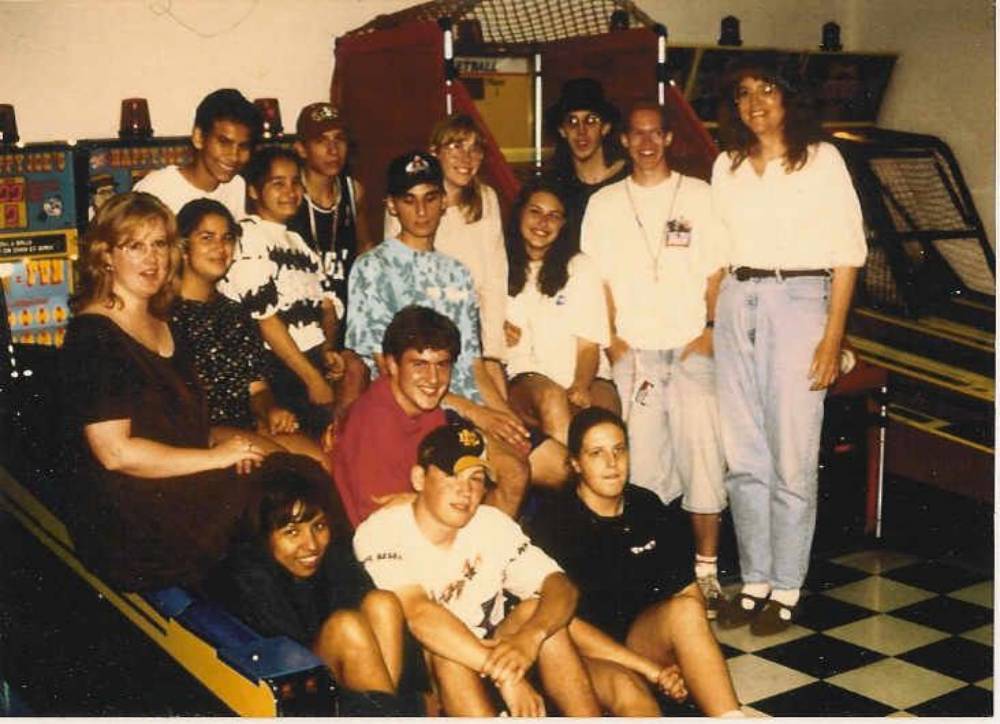
History of UND TRIO
As the UND Division of Student Affairs developed it was recognized there were students with special needs not necessarily met in the “mainstream” of student life. Hence pro-grams to meet those needs at the University of North Dakota grew and became more complex. The sponsorship of UND TRIO Programs by the university assisted in this effort to afford educational access to all populations.
The 1960s
In 1966, Dr. Craig Miller, Director of the Student Union, with assistance from Andrea Foote, an employee at the union, wrote and submitted the first proposal to apply for TRIO/Upward Bound funding. The grant application was successful and Upward Bound officially received federal funding that year. The program’s mission was to provide educational access to disadvantaged (low-income, first generation) high school students from across the state and promote both their enrollment in higher education and their completion of a four-year degree.
The Upward Bound Program was housed in the Memorial Union, and Dr. Miller became the first Upward Bound Director, reporting at that time to the Vice President for Academic Affairs. During these early years the Dean of Arts and Sciences, Dr. Bernard O’Kelly, was a true friend and consultant in many aspects of program development and operation. After a period of time, Craig Miller resigned and Duane Lawrence, his assistant, became Director of the program. In this time period, the program also made two physical location moves, first to Montgomery Hall, then to Robertson-Sayre Hall.

The 1970s
In April of 1970 the University of North Dakota submitted another successful TRIO proposal, written by Beulah Hedahl, this time for a Special Services Program grant (which later was renamed Student Support Services). In 1971 that program began, and it was housed in Budge Hall.
In 1972 Upward Bound was moved from the Academic Affairs Division and was combined with Student Special Services to form the Student Opportunity Program (SOP), which was placed within the Student Affairs Division. Duane Lawrence was named Director of the combined program and Ron Gibbens became the Director of the Upward Bound component. Ken Davis, who had directed the Special Services Program for one year, became Coordinator for the low-income component of SOP and Darrell Farland was named Coordinator of the handicapped student component. SOP offices were located in Chandler Hall and the Director reported to Dr. Russell Brown, Vice President for Student Affairs.
In 1975, the Student Opportunity Program department was relocated to McCannel Hall, along with other student services departments within the Division of Student Affairs. When Duane Lawrence resigned in 1976, Ron Gibbens became the Director of SOP.
In 1978 Neil Reuter became the Assistant Director of the Student Opportunity Program. The staffing remained the same for a number of years, but SOP continued to develop, through attaining grants from other sources. In 1976 it received a Regional Educational Program for the Handicapped (REPH) Grant that provided another separate funding source for services for disabled populations. This REPH Grant was competitively awarded to only 14 colleges across the nation. The recipients were viewed as model programs that demonstrated the various ways students with disabilities could be effectively served on college campuses. Attaining and implementing the REPH grant placed SOP and UND in an elite group of colleges having this grant, including such landmark schools as the University of Illinois at Urbana and Wright State University in Dayton, Ohio.
Additional funding for disabled students was garnered in 1979, when the North Dakota legislature approved state funding for UND Disabled Student Services. The University was the only school in North Dakota to be given a budget for serving students with disabilities and for many years was viewed as the institution that most students with disabilities would attend. It was also in 1979 that Disabled Student Services was split out from SOP to become a UND department in its own right.

The 1980s
In 1980, Ron Gibbens took another position in the Division of Student Affairs and Student Opportunity Programs was discontinued as a single unit. In this year, the overarching name of TRIO Programs began to be used to describe the combination of the newly funded Talent Search and continuing Upward Bound Programs. Neil Reuter was named TRIO Director over both the Talent Search and Upward Bound Programs, and this new department was moved organizationally to under the supervision of the Dean of Students Office, reporting to Dr. Gordon Henry, Associate Dean of Students until 1984, when Dr. Henry became Vice President for Student Affairs. At that juncture, the TRIO Programs began reporting to Lillian Elsinga, Dean of Students. During this same time period, Student Support Services Program was a separate department, also placed under the Dean of Students Office jurisdiction, with Bruce Austin serving as director. In 1987 Neil Reuter became director of the Student Support Services Program, in addition to Upward Bound and Talent Search, and the three programs now formed the TRIO Department.
In 1987 Neil Reuter became director of the Student Support Services Program, in addition to Upward Bound and Talent Search, and the three programs now formed the TRIO Department.
The 1990s
In the following years, with Neil Reuter’s vision and knowledge of national trends and accessibility of funding, successful grant applications were written for two more federal TRIO Programs at UND. The result of those applications was funding in 1991 for the Educational Opportunity Center Program and in 1992 for the McNair Post-Baccalaureate Program. Neil Reuter was named Director for these programs as well, and the number of UND TRIO Programs under his guidance expanded to five.
As programs were added, other significant personnel changes in TRIO occurred. In 1991 each program added a mid-management Assistant Director position. Those individuals (by program) were: René Strege, Upward Bound; Joan Jorde, Student Support Services; Elaine Metcalfe, Talent Search; Lori Swanson, Educational Opportunity Center; and Patrice Giese, McNair Post-Baccalaureate Program. In terms of physical location, as McCannel Hall was being renovated during this time, TRIO Programs were relocated on a temporary basis; first at Bek Hall, then at O’Kelly Hall. One of the highlights for TRIO Programs took place in 1999, when TRIO Programs moved back into a newly renovated facility especially designed for the programs on the third floor of McCannel Hall. In 2000 there was another divisional structural change, and TRIO Programs were placed under the supervision of the Associate Vice President for Enrollment Management, Dr. Donald Piper, then Alice Hoffert and finally Lisa Burger. TRIO briefly fell under Sandra Mitchell, Associate VP of Diversity and Inclusion, but was quickly returned to the VP of Student Affairs under Alex Pokornowski, Asst. VP for Student Affairs and Asst. Dean of Students.
The 2000s
During 2001-2006 one other TRIO staff administration change was made in response to program growth and needs. In 2001 Elaine Metcalfe was named TRIO Associate Director, serving a percentage for each of the five programs; and she also continued to serve as the Assistant Director for Talent Search. Upon Neil Reuter’s retirement in 2006, Elaine Metcalfe became the Director of the UND TRIO Programs until her retirement in 2014. After Elaine’s retirement, Derek Sporbert moved from his position as EOC Assistant Director to TRIO Program Director.
Nationally, throughout its 50+ year history, the funding and policy development of TRIO Programs have grown substantially and the UND TRIO Programs have mirrored this growth, adding services and staff as funding increased. For many years, under the strong and conscientious leadership of Neil Reuter and Elaine Metcalfe, the UND TRIO Programs gained recognition locally, regionally and nationally for growth, stability and innovation. They were instrumental in forming support networks for the programs such as the TRIO Advisory Board and TRIO Alumni Society, which are comprised of university and community resource people and former TRIO Program participants who advocate at all levels for TRIO Programs. The current picture for UND TRIO Programs remains bright with continued direction and purpose supporting its development and stability.
Programs
Currently, the five UND TRIO Programs are: Upward Bound, Student Support Services, Talent Search, Educational Opportunity Center, and McNair Post Baccalaureate Program. Each program has the same mission of advocating for equal educational access for low-income, first-generation college students, but serves different aged populations with a variety of service intensity.
- The Upward Bound Program is designed to generate the skills and motivation necessary to complete a program of secondary education and to enter and succeed in a program of secondary education in 88 program participants. Intensive services are provided including a six-week summer residential academic program for 65 participants. Program participants are students in grades 9-12 in targeted public high schools, who are first-generation and low- income, as well as demonstrating academic potential and in need of career guidance. Upward Bound currently is headed by Asst. Director Phil Coghlan.
- The Talent Search Program is an outreach program, which provides assistance to people having academic potential, but lacking adequate information on school preparation to enter, continue or resume programs of secondary and post-secondary education. Participants are provided assistance in applying for financial aid, admissions, career exploration, academic advisement, ACT workshops, tutoring, and study skills.
- The program targets 971 students who are 11 years of age through high school seniors in specifically targeted public high schools. Talent Search is currently headed by Asst. Director Dawn Eckhardt.
- The Educational Opportunity Center is designed to assist participants who have academic potential but may back adequate information or school preparation to enter, continue or resume programs of secondary and/or postsecondary education. The program serves 1,204 people age high school – adult, who is in need of assistance in entering/re-entering secondary or post-secondary education systems. Participants are provided assistance with admissions, career exploration, financial aid, academic advisement, tutoring, and personal counseling. Also, a number of workshops are provided. Examples include study skills, career exploration, time management, etc. Educational Opportunity Center is currently headed by Asst. Director Lori Larson.
- Student Support Services provides services to low income, first generation college students and/or students with disabilities. Student Support Services provides academic, financial, personal, cultural/social assistance to three hundred UND students with those qualifications. The program is designed to increase retention and graduation rates, facilitate their transfer from two year to four-year colleges, and foster an institutional climate supportive of the success of low-income and first-generation college students and students with disabilities. Student Support Services is currently headed by Asst. Director Joan Jorde.
- The Ronald E. McNair Post-Baccalaureate Achievement Program is designed to provide 28 disadvantaged college students with effective preparation for doctoral study. The McNair Program provides participants with opportunity for research or other scholarly activities, summer internships, numerous seminars, tutoring, academic counseling, mentoring and assistance in applying for graduate school. McNair students are generally accepted in the program after their sophomore year in college. The Ronald E. McNair Program is currently headed by Asst. Director Kelly Kennedy.